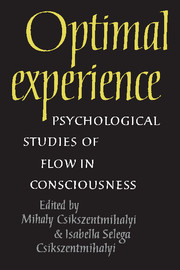Book contents
- Frontmatter
- Contents
- Acknowledgments
- Contributors
- I A THEORETICAL MODEL OF OPTIMAL EXPERIENCE
- II VARIETIES OF THE FLOW EXPERIENCE
- III FLOW AS A WAY OF LIFE
- IV THE MEASUREMENT OF FLOW IN EVERYDAY LIFE
- 15 Introduction to Part IV
- 16 The systematic assessment of flow in daily experience
- 17 The quality of experience in the flow channels: comparison of Italian and U.S. students
- 18 Flow and the quality of experience during work and leisure
- 19 Optimal experience and the uses of talent
- 20 Self-esteem and optimal experience
- 21 Optimal experience and the family context
- 22 The future of flow
- References
- Name index
- Subject index
16 - The systematic assessment of flow in daily experience
Published online by Cambridge University Press: 05 June 2012
- Frontmatter
- Contents
- Acknowledgments
- Contributors
- I A THEORETICAL MODEL OF OPTIMAL EXPERIENCE
- II VARIETIES OF THE FLOW EXPERIENCE
- III FLOW AS A WAY OF LIFE
- IV THE MEASUREMENT OF FLOW IN EVERYDAY LIFE
- 15 Introduction to Part IV
- 16 The systematic assessment of flow in daily experience
- 17 The quality of experience in the flow channels: comparison of Italian and U.S. students
- 18 Flow and the quality of experience during work and leisure
- 19 Optimal experience and the uses of talent
- 20 Self-esteem and optimal experience
- 21 Optimal experience and the family context
- 22 The future of flow
- References
- Name index
- Subject index
Summary
In considering possible future empirical research on flow, a central desideratum was expressed in the last pages of Beyond Boredom and Anxiety: “The flow model could be extended to work situations and other ‘non leisure’ settings…it is important to find out piecemeal and experimentally what combination of challenges and skills can be accommodated in a schoolroom, a neighborhood, or at home, so that … [we] can maximize flow involvement in as many people as possible” (Csikszentmihalyi 1975b, p. 203). The present chapter describes such a project.
The transition from theory to empirical validation is never easy, especially when the phenomenon is a complex one. When it belongs to the class of “subjective experiences,” the methodological challenge becomes even more baffling. In this context, the problem consists of finding a way to describe variations in the quality of subjective experience as a function of variations in the conditions of flow – that is, as a function of the relationship between the levels of perceived challenges and perceived skills.
Flow is a relatively rare experience, difficult to encounter every day, at least in our culture and for the majority of people. It was first described in groups of people who, because of their specialized activities and because of their strong involvement, were able to come in contact with this experience in its highest forms – chess masters, rock climbers, surgeons, and so on (Csikszentmihalyi 1975b).
Information
- Type
- Chapter
- Information
- Optimal ExperiencePsychological Studies of Flow in Consciousness, pp. 266 - 287Publisher: Cambridge University PressPrint publication year: 1988
Accessibility standard: Unknown
Why this information is here
This section outlines the accessibility features of this content - including support for screen readers, full keyboard navigation and high-contrast display options. This may not be relevant for you.Accessibility Information
- 183
- Cited by
